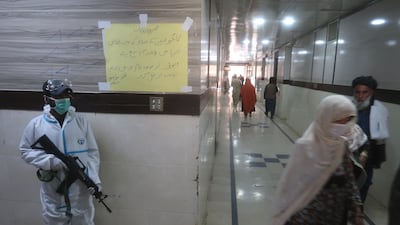One doctor lost his life while at least 47 other people have been infected by Congo virus in Pakistan’s Balochistan province and authorities declare a health emergency in the area.
The virus, which is extremely difficult to treat and can have a fatality rate of up to 40 per cent, is carried by ticks on cattle. Patients can be given the antiviral drug ribavirin, but it is not widely available in remote areas, where the current outbreak has taken hold.
The disease outbreak is being compounded by the great distances to health facilities where the virus can be treated. Patients are mostly taken to Karachi in Sindh province for treatment, but air ambulances are sometimes cancelled due to bad weather conditions while road travel is risky for patients who may not be able to endure the arduous journey.
Speaking to The National, Balochistan Minister for Health Dr Ameer Muhammad Jogezai said that the increasing case numbers were because of the nearby Afghan border.
“These cases have been reported over the months. But this time the disease has hit headlines because it has also infected 12 medics, including doctors and paramedics,” he added.
“The first case was a Congo virus patient coming from Pishin area to Quetta Civil Hospital for treatment on October 21 and the same patient later infected the hospital staff too,” he said.
Dr Jogezai said that most people living in suburban areas of Balochistan outside Quetta city live alongside their cattle, which is why so many people were infected by the disease.
One doctor, Shakur Ullah, died from the disease while four other doctors as well as paramedics have been admitted to Agha Khan Hospital in Karachi in a serious condition.
“Three hospital staffers, a chowkidar [security guard] and another administration employee fled the premises after suspecting they were also the Congo virus carriers. We conducted raids and got hold of them for treatment,” Dr Jogezai said.
He advised people to use gloves and facemasks while handling their cattle. “We have already banned cattle markets in Balochistan at the moment and have also started spraying various areas to eliminate the virus,” he said.
The minister said that he had learnt that Agha Khan Hospital may also face problems admitting more patients. But he said he was in contact with authorities in the adjacent Sindh province and a ward in the Sindh government’s Infectious Diseases Hospital has now been allocated for Congo virus patients.
He said there is no cure for the disease at the moment but it is asymptomatic.
An anonymous official in Quetta said that while the provincial government was making efforts to control the situation, a major problem is that the underdeveloped Balochistan lacked health facilities to treat patients, which is why the victims are being referred to Karachi, Sindh province.
He said the reason behind the fatality so far was because the road was blocked and the patient could not be moved to hospital in time.
Abdul Rehman, a resident of Quetta, said that people in the area were cautious, while local authorities sprayed chemicals to kill virus-carrying ticks.
He saidthat in his house, his family had started using gloves while milking their cows.

